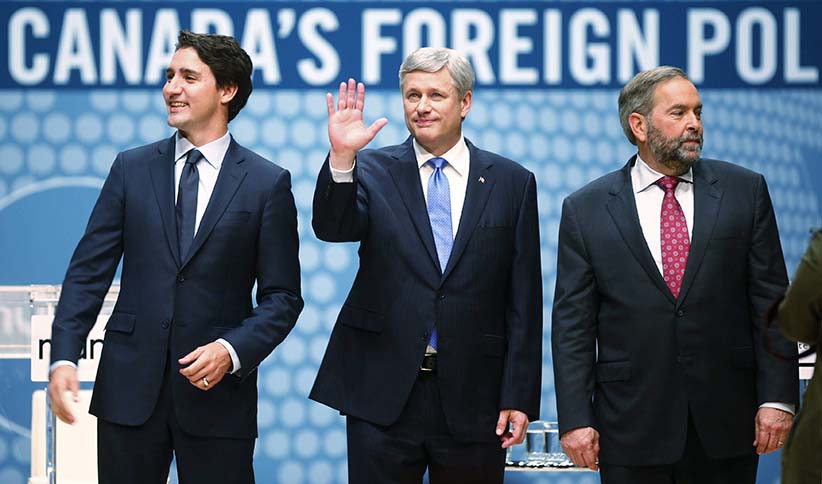An open letter to undecided voters
It’s not easy being an undecided voter. But it’s not you, it’s them, as Evan Solomon explains.
Share

I don’t blame you, Undecided Voter. I really don’t. This is such a close election and making up your mind is tricky. Everyone wants your vote. You’ve got the “change wave” folks telling you 10 years is just too long for one guy. There are the “don’t take a risk” people whispering that, while things aren’t perfect, they could get much, much worse if you switch. And then you’ve got those pesky “strategic vote” eggheads trying to convince you that your vote really can count if you become an expert in game theory.
Fact is, in such a close election, you, Undecided Voter, will be the difference between winning and losing.
“There are two parts of the undecided-voter block,” says Ekos pollster Frank Graves. “The apathetic disengaged who aren’t going to vote—more than half—and the genuinely conflicted and ambivalent, who will vote in the final stages.” According to Graves, the undecided-voter group is actually quite small, less than 15 per cent of the vote and dropping.
The truth is, Undecided Voter, you are not the problem. The problem is the parties themselves.
Look at the Conservative-leaning undecided voters, wrestling with some stone-cold contradictions in the Conservative agenda. The great balanced-budget believer, Stephen Harper, ran six consecutive deficits. For years, he argued that stimulus spending was the critical job multiplier. Now he says only balanced budgets create jobs. Huh? You might think Harper would fight the state’s intrusion on individual rights. Nope. He defends the state’s right to force a woman to take off her niqab during citizenship ceremonies. After all, Harper wouldn’t force his own daughter to wear a niqab. Is that really a Conservative test? He hasn’t said anything about, say, Orthodox Jewish women wearing a sheitel—a wig—to cover their heads. Or dozens of other religious practices he might not force on his daughter. Back off, nanny state, right? Religious freedom.
The line gets a bit fuzzy here when we talk about the niqab. And let’s not start on selling $15 billion worth of arms to Saudi Arabia, where the strict Wahhabist tradition supports the niqab, not to mention beheading. Is this situational ethics or pragmatic engagement? And what about the military? Conservatives were supposed to end the so-called Liberal “decade of darkness” and rebuild the military. But, according to a new Canadian International Council study that measured Canada’s global engagement, we’ve been more bang than bullet. The study totalled spending on defence and international aid—hard and soft power—and found Canada ranked dead last in the G7. “Canada’s global engagement is a full 40 per cent lower than the G7 average,” the report said.
No wonder the undecided Conservative voter is having a tough time. The party isn’t sure of itself, either, although that may be changing as the campaign sharpens. Graves is seeing that some of the undecided voters who were once part of the 2011 Conservative vote are starting to return to the team. Harper has his 30 per cent base, but that critical nine per cent he once wooed may be swinging back. “The Conservative 2011 voters were three times more likely to be undecided as those supporting other parties,” Graves says. “But they are undecided no more, coming back to the fold, largely on the strength of niqab and terror themes.”
Find out where you stand in this election using our Policy Face-off Machine
The centre-left-leaning undecided voter has it just as bad. The NDP is suddenly preaching balanced budgets, even if it means delaying some social programs, while the once-deficit-slaying Liberals now claim deficits are the way forward. Both criticize the Conservatives for fudging the books on budgets. Both support national child care. The NDP will raise corporate income taxes a few points, while the Liberals will raise personal income taxes on a few of the rich. Neither likes the anti-terror Bill C-51, but one rejected it outright and will re-legislate and the other voted for it but would change it if elected.
For all their similarities, the NDP and the Liberals loathe each other in ways that have you lunging for a psychoanalysis book on Freud’s narcissism of small differences (where you hate the ones you most resemble). “Go to therapy, people,” I can hear the Undecided Voter yell.
Even the parties know they have a serious identity crisis. A senior Liberal strategist told me it’s a mistake to believe parties can tack left or right and scoop up voters in a post-partisan world. In other words, the colours red, orange and blue are as outdated as album covers in a record store. “The post-partisan world is one of skepticism and cynicism,” agrees pollster Nik Nanos of Nanos Research. He says only four out of 10 Canadians are actually loyal to a party, leaving the rest as free agents. “The stability of the tight race belies the true volatility that is realistically out there.”
Once the voter stops believing in the political party, she becomes capable of believing anything, to paraphrase G.K. Chesterton. So, Undecided Voter, it’s really not you. It’s them. If they don’t know who they are, why should you?
[widgets_on_pages id=”Election”]